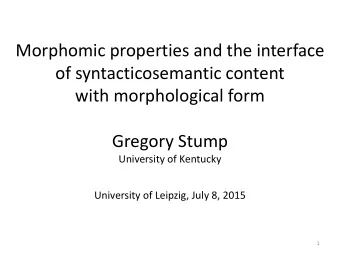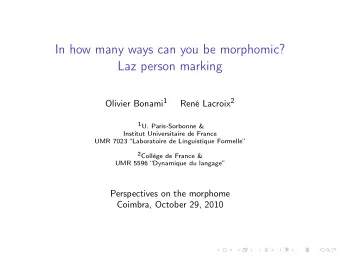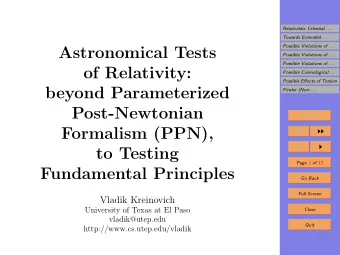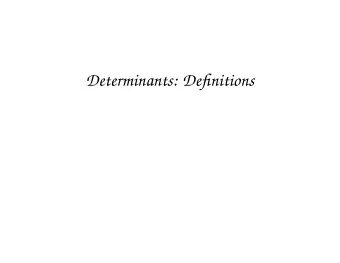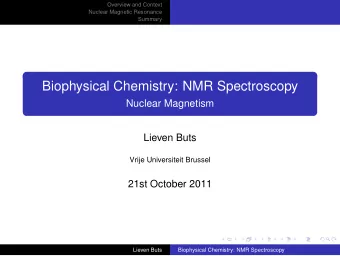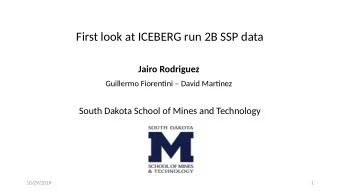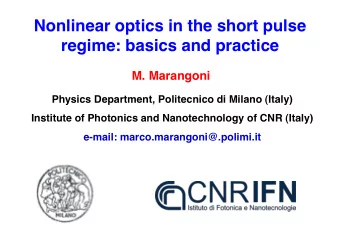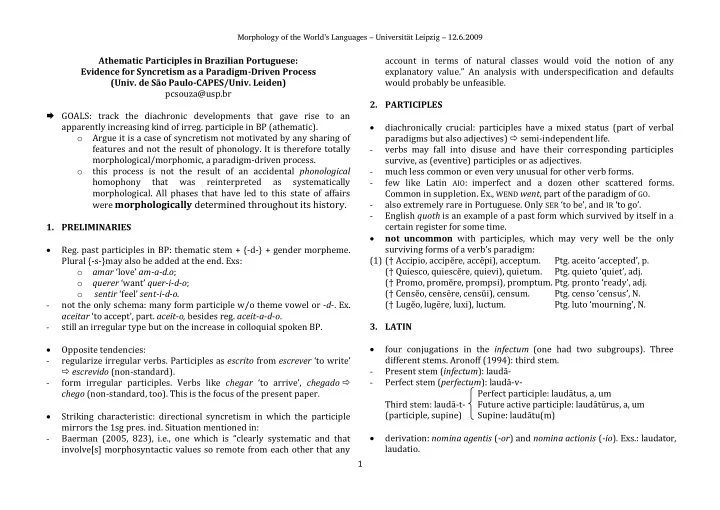
another morphomic fact. It was only possible to create derived verbs - PowerPoint PPT Presentation
Morphology of the Worlds Languages Universitt Leipzig 12.6.2009 Athematic Participles in Brazilian Portuguese: account in terms of natural classes would void the notion of any Evidence for Syncretism as a Paradigm-Driven Process
Morphology of the World’s Languages – Universität Leipzig – 12.6.2009 Athematic Participles in Brazilian Portuguese: account in terms of natural classes would void the notion of any Evidence for Syncretism as a Paradigm-Driven Process explanatory value.” An analysis with underspecification and defaults (Univ. de São Paulo-CAPES/Univ. Leiden) would probably be unfeasible. pcsouza@usp.br 2. PARTICIPLES GOALS: track the diachronic developments that gave rise to an apparently increasing kind of irreg. participle in BP (athematic). diachronically crucial: participles have a mixed status (part of verbal o Argue it is a case of syncretism not motivated by any sharing of paradigms but also adjectives) semi-independent life. features and not the result of phonology. It is therefore totally verbs may fall into disuse and have their corresponding participles - morphological/morphomic, a paradigm-driven process. survive, as (eventive) participles or as adjectives. o this process is not the result of an accidental phonological much less common or even very unusual for other verb forms. - homophony that was reinterpreted as systematically few like Latin AIO : imperfect and a dozen other scattered forms. - morphological. All phases that have led to this state of affairs Common in suppletion. Ex., WEND went , part of the paradigm of GO . were morphologically determined throughout its history. also extremely rare in Portuguese. Only SER ‘to be’, and IR ‘to go’. - English quoth is an example of a past form which survived by itself in a - 1. PRELIMINARIES certain register for some time. not uncommon with participles, which may very well be the only surviving forms of a verb’s paradigm: Reg. past participles in BP: thematic stem + {-d-} + gender morpheme. (1) († Accipio, accipĕre, accēpi), acceptum. Ptg. aceito ‘accepted’ , p. Plural {-s-}may also be added at the end. Exs: o amar ‘love’ am-a-d.o ; († Quiesco, quiescĕre, quievi), quietum. Ptg. quieto ‘quiet’, adj. o querer ‘want’ quer-i-d-o ; († Promo, promĕre, prompsi), promptum. Ptg. pronto ‘ready’ , adj. o sentir ‘feel’ sent-i-d-o. († Censĕo, censēre, censŭi), censum. Ptg. censo ‘ census ’ , N. († Lugĕo, lugēre, luxi), luctum. Ptg. luto ‘mourning’ , N. not the only schema: many form participle w/o theme vowel or -d- . Ex. - aceitar ‘to accept’, part . aceit-o, besides reg. aceit-a-d-o . 3. LATIN still an irregular type but on the increase in colloquial spoken BP. - four conjugations in the infectum (one had two subgroups). Three Opposite tendencies: regularize irregular verbs. Participles as escrito from escrever ‘to write’ different stems. Aronoff (1994): third stem. - Present stem ( infectum ) : laudā - escrevido (non-standard). - Perfect stem ( perfectum ) : laudā -v- form irregular participles. Verbs like chegar ‘to arrive’, chegado - - Perfect participle: laudātus, a, um chego (non-standard, too). This is the focus of the present paper. Third stem: laudā -t- Future active participle: laudātūrus, a, um (participle, supine) Supine: laudātu(m) Striking characteristic: directional syncretism in which the participle mirrors the 1sg pres. ind. Situation mentioned in: Baerman (2005, 823), i.e., one which is “clearly systematic and that derivation: nomina agentis (- or ) and nomina actionis (- io ). Exs.: laudator, - laudatio. involve[s] morphosyntactic values so remote from each other that any 1
Morphology of the World’s Languages – Universität Leipzig – 12.6.2009 another morphomic fact. It was only possible to create derived verbs 2) verto, vertere, versum: ‘turn’ - from verbs based on the third stem. verso, versare, versatum: ‘whirl’ 3) cedo, cedere, cessum: ir, ‘grant, give’ Aronoff (1994, 46) - there were three kinds of verbs derived on the cesso, cessare, cessatum: ‘cease’ third stem of Latin verbs: 4) pello, pellere, pulsum: ‘hit, drive away’ desideratives: cenaturio , esurio , parturio . - pulso, pulsare, pulsatum: ‘knock, strike (the hour)’ iteratives or frequentatives added - ĭtō/ - ĭtāre to the athematic form of - the third stem. Exs.: IMPORTANT: intensive verbs are the ones that matter for our purposes (2) script- ĭtō ‘write often’, from scrib- ō , scrips- ī , script-um ‘write’ ; here. They always belonged to the first conjugation . What Aronoff calls vīs - ĭtō ‘visit’, from vide- ō , vīd - ī , vīs -um ‘see’ ; the morphomic level contains purely morphological properties. In this iact- ĭtō ‘throw often’, from iaci- ō , iēc - ī , iact-um ‘throw’. sense, it is a morphomic fact that the third stem of Latin verbs is ultimately the base on which both the past participle and the so-called Intensives were formed simply by adding first conjugation endings, intensive verbs are formed. - including the theme vowel - ā - to the athematic form of the third stem. Exs.: with the creation of these new verbs, Latin had some participles related (3) iact- ō ‘throw forcefully/often’, from iaci- ō , iēc - ī , iact-um ‘throw’; to two lexemes at the same time. The stem puls - found in the participle volūt - ō ‘roll, meditate’, from volv- ō , volv- ī , volūt -um ‘roll’; pulsum contained the third stem of the primitive verb pello and was tract- ō ‘drag, handle’, from trah- ō , trax- ī , tract-um ‘pull’. identical to bare stem of derived verb pulso . Note that the past participle eventually became lexically related to two - Allen & Greenough (1888: 159): “Intensives or iteratives are formed different lexemes, since habitum , e.g., was related both to habeo and to - from the Supine stem and end in - tō or - itō (rarely - sō). They denote a habito . forcible or repeated action, but th is special sense often disappears.” Sometimes, derivatives ended u p ‘leading a life of their own’, - Ernout & Meillet (1967: 167): “{ canō correspond un intensif cantō , ās , undergoing an independent semantic drift. Ex.: - āuī , ātum , āre , qui, dès les plus anciens textes, concurrence canō sans 5) habeo, habere, habitum: ‘have, occupy’ [my underlining] que la nuance itérative ou intensive soit toujours habito, habitare, habitatum: ‘inhabit’ visible, et qui s’est spécialisé dans le sens propre de ‘chanter’. Cantō substitue seulement une flexion régulière { un verbe irrégulier.” some common Latin verbs replaced by their intensives: They also say that based on iaciō the frequentative iactō , ās , “lancer, iacio, iacĕre, iactum Fr. jeter - jeter souvent ou avec force”, was formed, and that it later started to cano, canĕre, cantum pan-Romance cantar mean ‘agiter’ or ‘mettre en avant’. They conclude by saying that accipio, accēpi, acceptum Ptg. aceitar , It. accettare “Iactare ... qui { basse époque s’emploie comme synonime de iaciō , a seul subsisté et a remplacé iacere dans les langues romanes.” A regular morphomic association between derivationally related forms One further remark they make is that “de saliō existe un itératif-intensiv gave rise to an accidental identity within an inflectional paradigm, - ancien et usuel saltō , ās … qui tend { se substituer { salīre .” which was then reinterpreted as systematic and is gradually being Some more examples follow: extended. - 1) crepo, crepare, crepitum: ‘rattle, crack ’ Baerman (2005): an indicator of systematicity is the diachronic crepito, crepitare , crepitatum: ‘crack repeatedly’ extension of a syncretic pattern. 2
Recommend
More recommend
Explore More Topics
Stay informed with curated content and fresh updates.

